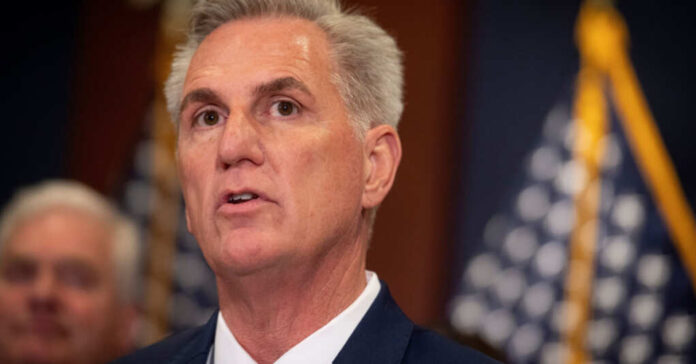
House Speaker Kevin McCarthy (R-CA) faced an uncertain future in the House in January of 2023. The embattled representative’s bid for speakership was far from a given as many House members expressed distrust of a McCarthy-led Republican House. McCarthy struggled through 15 ballots, a scenario unseen since the Civil War.
At the heart of the debate were the questions of his true conservative values and his willingness to toe the party line.
The victory came at a cost for the speaker as he agreed to many concessions to grab the gavel. The most problematic concession for McCarthy is the re-emergence of the ability to call a vote of no-confidence and remove the speaker in a “motion to vacate.” It only takes one representative from either side to set a “motion to vacate” in motion and force a vote on the matter, and the possibility will hang like the Sword of Damocles over McCarthy’s head throughout his speakership.
To date, a motion to vacate has never been successfully used to remove a speaker from either side of the aisle. In 2019, Democrats modified the rule, stating that a vacancy resolution must be “offered by the direction of a party caucus or conference. Within McCarthy’s numerous compromises, the rule was reset to allow the motion to vacate to be filed by only one member of the House, regardless of political affiliation.
It didn’t take long for McCarthy to slip into disfavor with his House. While he has dodged bullets so far, the debt ceiling deal may be the beginning of his undoing.
At the end of April, the Republican-led House passed a version of the debt ceiling deal, proposing to raise the debt ceiling by $1.5 trillion to $32.9 trillion. The increase came with conditions, such as responsible spending limits, that Democrats opposed. President Biden, who had gambled on the Republican’s inability to come together and pass the bill, had gone on record many times stating his refusal to negotiate.
As the deadline loomed ever closer, Biden and McCarthy began to hold closed-door meetings, each hoping the other would make enough concessions in time to beat the clock.
At the end of negotiations, McCarthy emerged with a watered-down version of the House-passed bill. which originally featured steeper spending cuts, policy provisions, and a smaller debt limit increase. The Biden/McCarthy version was hardly recognizable, with only small concessions designed to appease the Republican-led House.
McCarthy emerged from negotiations claiming victory and immediately passed the new deal on for a vote. Unsurprisingly, the measure only passed because of Democratic votes, proving how disastrous the legislation was for Republicans.
For McCarthy, it’s been a “sorry, my bad” scenario. The House Speaker is soothing a potential uprising with promises of more transparency in future negotiations and spending more time listening to Republican concerns moving forward.
This is the political equivalent of shutting the barn door after the horse escaped, however, and many conservatives are not buying it. The debt ceiling was their strongest possibility of achieving fiscal responsibility, and many Republicans believe that McCarthy blew it. Biden has been given free rein to continue advancing his spending sprees and unchecked progressive agenda, and the damage could be irreversible by the time Republicans reclaim the White House in 2024.
The rumblings in the House range from “that’s ok, we’ll get them next time” to the unthinkable consideration of a “motion to vacate.” The loudest voices in the room are from the Freedom Caucus, a group of around fifty hard-lined conservatives. But even they are hesitant to recall McCarthy, despite their blistering disappointment in the results of the debt-ceiling negotiations.
Rep. Dan Bishop (R-N.C.) was the first conservative to promote the idea of removing McCarthy after the debt ceiling fiasco, but far from the only one. “The discussion about the motion to vacate is going to happen in the next week or two,” Rep. Ken Buck (R-CO) said. “The people in our [districts], outside the Beltway right now, are saying, ‘$4 trillion is too much, you’ve got to get a new Speaker.”
Others are more forgiving, including Freedom Caucus member Chip Roy (R-TX), who is advising McCarthy to “mend fences. “There’s going to need to be a bit of a reckoning and a kind of review of how we’re organizing ourselves in order to get things done,” Roy stated.
For McCarthy, mending those fences is imperative if he wants to keep his House leadership role. So far, despite his dismal performance on the debt ceiling, it appears the House is reluctant to force a vote on his removal.
To understand the concessions McCarthy made in the deal, it’s important to recognize his position. While conservatives demand fiscal responsibility, Democrats are unwilling to curb spending and are fighting to keep every dime to advance their progressive agenda. McCarthy was against a wall; stay true to the House-passed bill and face the first-ever U.S. default or concede to demands and extend the debt limit until after Republicans win back the White House in 2024 and have a better chance to reign in the out-of-control spending spree Democrats are currently enjoying.
If the U.S. had defaulted, citizens would have faced financial hardship worse than experienced during the Great Depression, and Democrats would seize on the opportunity to blame Republicans and destroy any hopes for a 2024 victory. McCarthy’s hands were tied, and he arguably did the best he could under the circumstances. This is what is ultimately keeping his speakership safe, for now.
Marjorie Taylor Greene (R-GA.) understood the position House Speaker McCarthy faced, weighing in on the possibility of a motion to vacate by explaining that, in her opinion, “It’d be a really dumb move. I live in reality, not conservative fantasyland.”
Rep. Nancy Mace (R-SC.) agrees and continues to support McCarthy despite her opposition to the debt ceiling deal. “I disagree with him vehemently on this thing. … But we can agree to disagree on a lot of things,” she said.
McCarthy weakly defended himself, stating, “Every day, I could wake up and improve. There’s so many times I stumble as we go. It’s difficult in a time of negotiations to keep your full conference abreast, because as we do, you all leak it, and you can’t negotiate once you leak. So something blows something else up.”
He is maintaining his “oops, mistakes were made, I’ll be better I promise” attitude, pledging to do better in the future. But this deal was crucial, and he flubbed it spectacularly.
Conservatives may be willing to forgive, but they are unlikely to forget the betrayal they witnessed in McCarthy.















